Milly
The Hills of Kent, 1919-1933
“Daddy, do the flowers and the trees belong to Mr. Gordon-Brown?” I asked from my perch on my father’s shoulders as I surveyed nature’s bluebell bounty all along the tree-lined lane.
“Yes, I guess you might say they do,” he replied, as he adjusted his collar.
“Daddy, do the cows eating grass over there belong to Mr. Gordon-Brown?” I could see one mother cow carefully licking her soft brown calf with her big tongue.
“Yes, Milly,” he said and started to sing a favorite hymn:
“Daddy, please,” I interrupted,” what about the birds singing, do they belong to Mr. Gordon-Brown? “
“Yes,” he said after a pause, “the birds are nesting on trees on his property, so you could say that they are his.”
“And Daddy, what about our house?”
“Yes, that too belongs to the Gordon-Brown Estate.”
“Daddy, I live in one of his houses, so who do I belong to?”
“Milly, you are Daddy’s own precious little girl,” he assured me.
I patted his neatly combed brown hair. ”Daddy, do you belong to Mr. Gordon-Brown?”
He stopped and looked out over the fields. “No, I work for him, Milly, and our house is his, but I belong to God.” He gave my braids a tug and started to sing again. We continued for another mile without questions.
As the country village came into view I could see the silhouette of the tall Church of England steeple. “Daddy,” I asked, “what are you going to talk to the people about this afternoon?”
“Well, my little Milly, I want to make sure that everyone knows that the Lord is coming back very soon.”
Mother always said that she thought that Daddy was in a rut on this subject, but he must have liked being in a rut, since I never heard him deviate from it.
He proceeded to quote I Corinthians 15:52, In a moment, in the twinkling of an eye, at the last trump: for the trumpet shall sound, and the dead shall be raised incorruptible.
I batted my eyes to see how quickly a “twinkling” could be, as we entered the village with its humble cottages and pleasant flower-strewn front yards, passed the stone arch of the Church of England and headed to the little chapel a few blocks beyond.
“Good evening Mr. Halliday,” a bowed old man greeted my father. “I see you’ve brought a rose from your garden with you.”
My father was the gardener on Mr. Gordon-Brown’s huge estate, but I knew that the old man meant me. I blushed as I squeezed Daddy’s neck with my legs.
Inside the church I sat quietly on the front bench. After a few hymns Daddy started to speak.
“I would like everyone to turn to Matthew 24:37 and 40, As the days of Noah were, so shall also the coming of the Lord be. Then shall two be in the field; the one shall be taken, and the other left. Now, please, look up Luke 17:30 to 36. In that night there shall be two men in one bed; the one shall be taken, and the other shall be left…Two men shall be in the field; the one shall be taken, and the other left.”
Daddy continued talking, but the terrible word ‘left’ had stuck in my mind. Surely if Daddy went somewhere, he’d take me with him, especially if he went so far away as Heaven!
I thought about this through the rest of the service, then fell asleep on the pew. The next thing I knew, I was being tucked into bed next to my sister Ruth.
“Good night Daddy. Don’t go anywhere without me.” I murmured as I fell back to sleep.
In the morning I ran downstairs, gulped my breakfast, helped Mummy clear the table, then asked, “May I please go and help Daddy today?”
“Yes, Milly, your sisters, Gladys, Grace, Elsie and Ruth can help me in the house. You may go to the greenhouse this morning.”
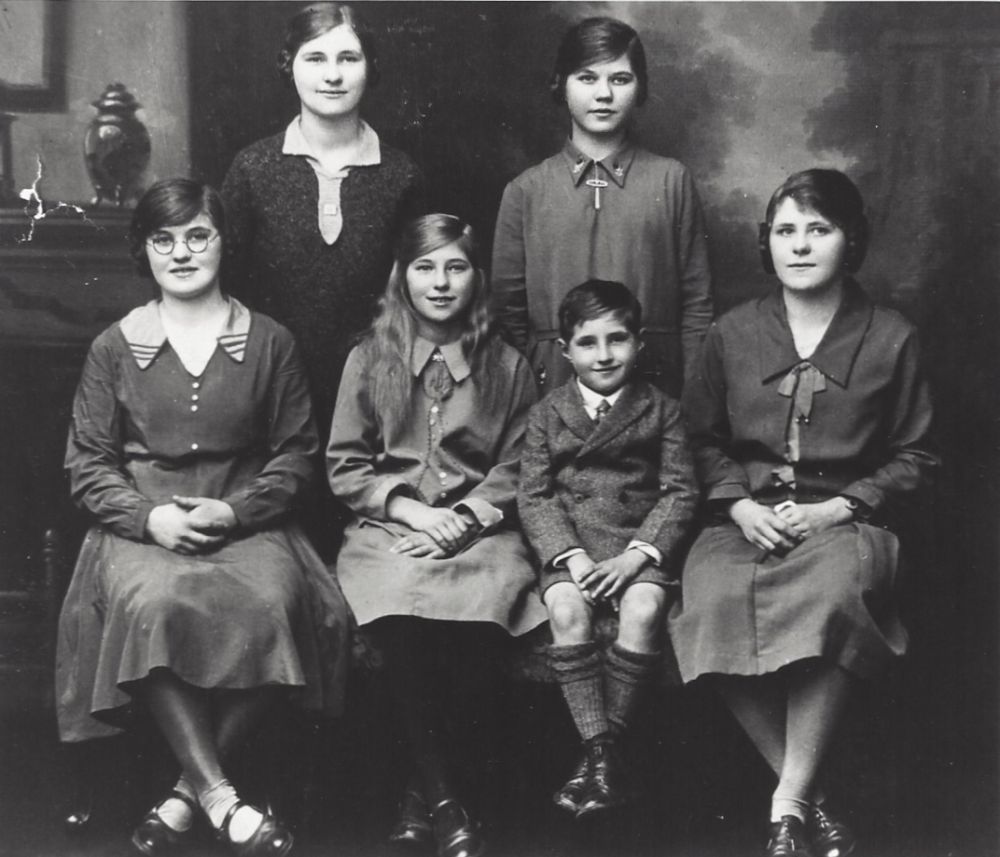
I contentedly skipped the short distance to where my father worked, then fell to my knees next to him as he potted seedlings. The rich brown earth sifted through my fingers as I filled pots. Daddy planted each seedling, then poured over it a cup of water.
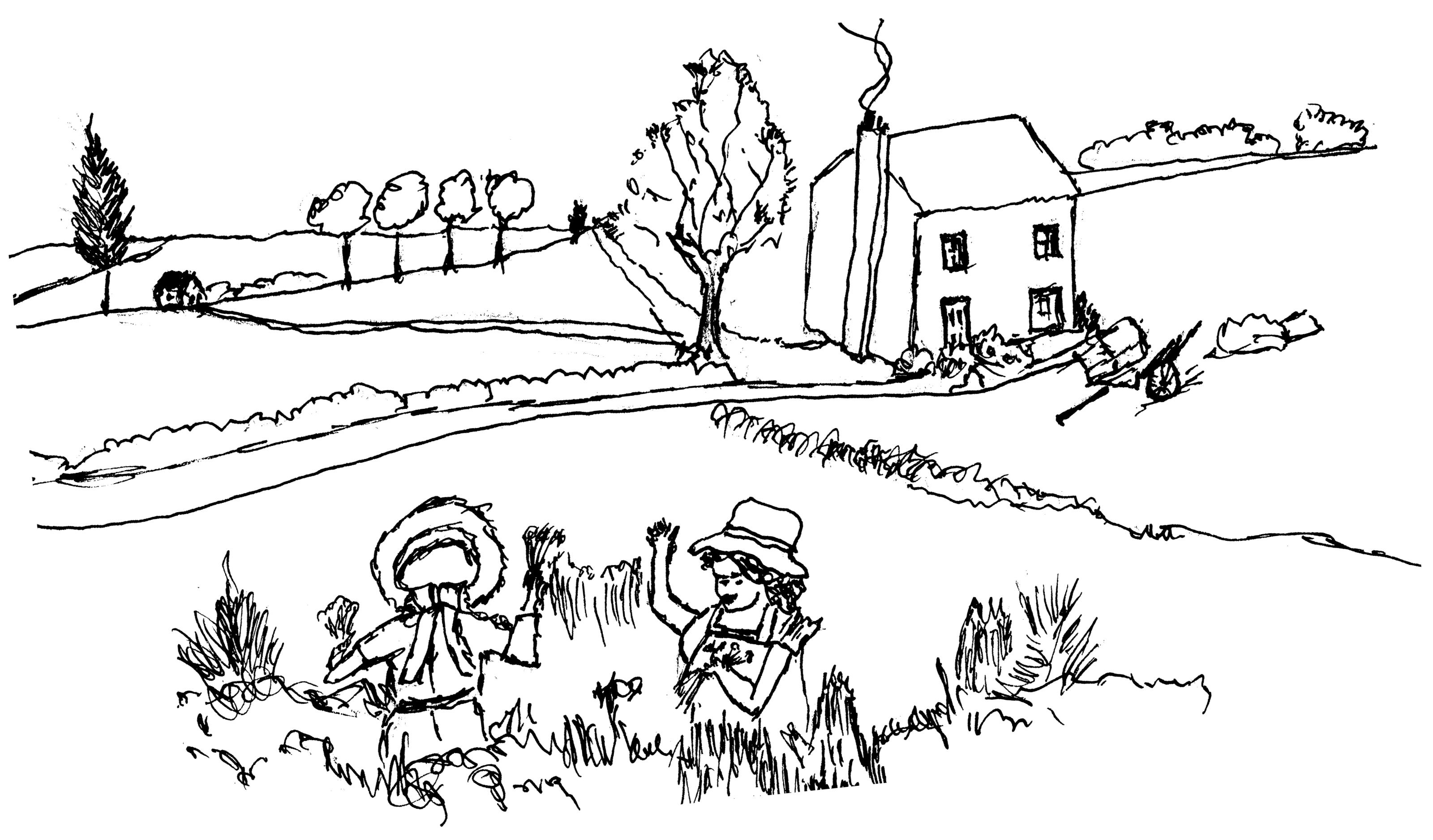
DADDY’S HELPER
As we worked I asked, “Did you get to help your daddy when you were my age?”
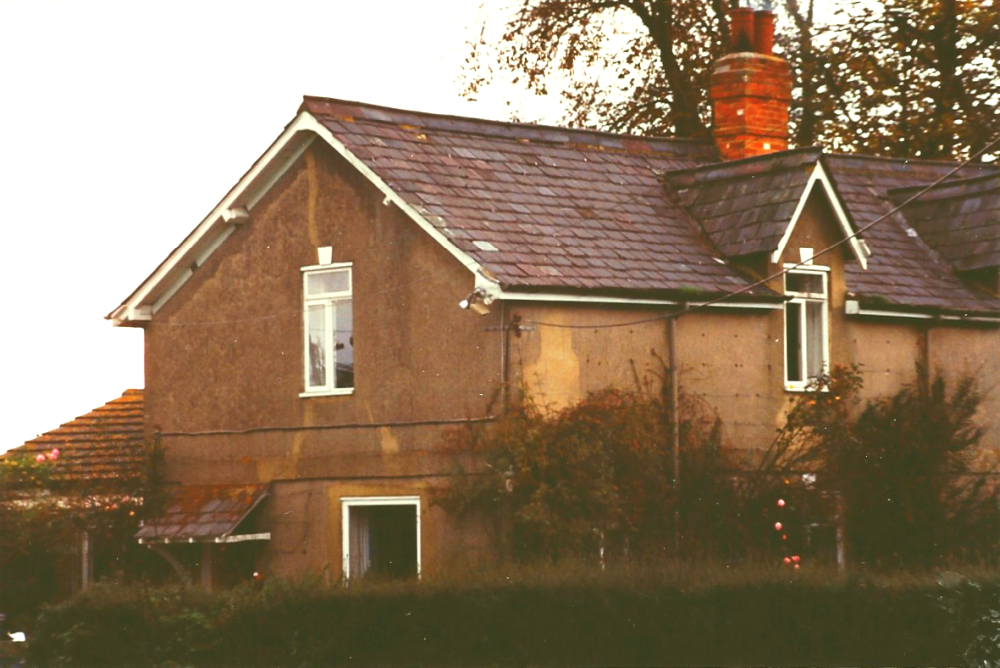
“My father worked on the train as a fireman, so that was too dangerous for me to help. I brought him his lunch sometimes and got to see the big engines come puffing into the station, but then I had to go home.”
“I’m glad that you don’t work for the railroad!” I said, as I handed him another filled pot.
“Well, I’m glad that your mummy still lets you come to the greenhouse after the scare you gave us the other day!”
On that memorable day, my sister Ruth had come with me to the greenhouse. We played ball inside while we waited for Daddy to call us to help. My sister threw a high ball to me. I ran backwards to catch it and toppled into the water trough. Ruth did not see me miss the ball but at that moment ran outside to see if Daddy was ready for us. When she returned to the greenhouse, at first she could not find me. Providentially she caught sight of me submerged in the water tank.
“Daddy! Daddy! Come quickly!” Ruth shrieked.
He dashed in, pulled me out of the water, and pounded my back. After a few frightening moments, I coughed, sputtered and gasped for breath.
Daddy wrapped me in a vegetable sack and prayed, ”Help us, Lord. O, help us Lord!” and quickly he rushed me home where I was immediately put to bed. All through the night my family kept a vigil to be sure I didn’t develop pneumonia. Nor was I allowed to get up the next day. Gladys, my oldest sister, made a special trip home from work to care for me. She sat on my bed and braided my hair. Grace, my sister next in line, brought me tasty treats. Elsie read a story to me, and Ruth and I played Naught and Crosses (tic-tac-toe) most of the day.
The following day my sister Grace brought me in a sweet pudding.
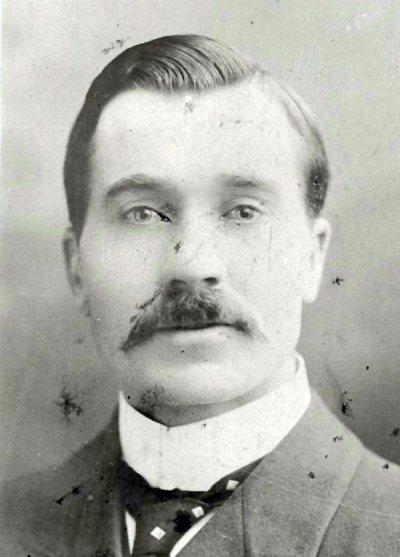
MILLY’S DAD
“Do you think when I get big I could be Daddy’s helper?” I asked. “I don’t want to go to somebody else’s house and work like Gladys does.”
“I don’t know, Milly dear, but get better today, and tomorrow Mummy will probably let you go back to the greenhouse.”
Sure enough, the next morning, after Mother listened to my chest, she reluctantly gave me permission to return to the greenhouse. I flew like a bee to honey, “Hello, Daddy! I’m back!”
Father called from behind some tall tomato plants, “Milly, you may help prune. Eat all of the tomatoes that you can put your finger around. And after that, you may help me pull weeds around the green beans.”
After I popped the last miniature tomato into my mouth, I joined Daddy outside. My mind was recalling a Bible story about Boaz and Ruth that we had read at our family devotions the night before.
“Daddy, Boaz met Ruth in a field, didn’t he? How did you meet Mummy?”
“When my family moved to England from Scotland I attended the Baptist church that your mother’s family, the Bennets and Castles, built. They owned the flour mill and a bakery. Being so important, they sat in the front pew of the church, and I who was poor sat in the back. During the services I used to look at your mother’s lovely brown hair, and think, what a pretty girl!” Daddy’s eyes got dreamy.
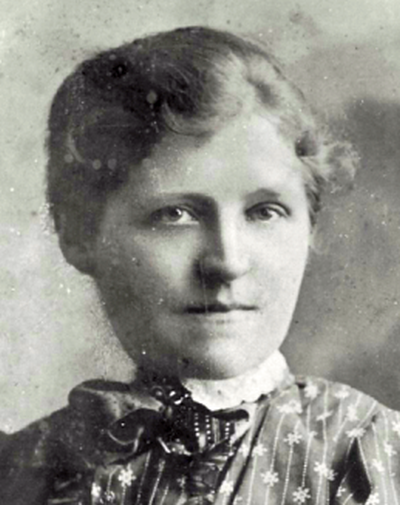
MILLY’S MUM
“And when church was over, I waited until her family passed my row just in case her lovely blue eyes would notice me. My heart just bounced around inside of me whenever she did!”
“Did she wear pretty dresses?”
“I don’t know, Milly. I met a farmer who told me about cows and their eyes.”
“Cows and eyes, Daddy? We’re talking about Mummy, not cows!”
“I know, dear, but the farmer taught me that the best cows, the ones that care for their calves, and give the best milk, all have kind, gentle eyes. The cows that should become roast beef, because they leave their calves and torment other cows, all have wild stares!”
“Daddy, do I have nice eyes?” I peeked over at him from the other side of the row of green beans.
“Just like your mother’s.”
I felt richer than a princess. “Did you marry Mother then, Daddy?”
“Not so fast as that, Milly! Your mother was engaged to another young man at church whom her mother favored, so I was very sad. Then I didn’t see her for a long time. She sailed to Canada to see her sister. While she was there, she decided she did not love her fiancee and canceled their engagement. Your mother wrote to me, and when she returned to England we got married! We were poor, which did not please Mother Bennet, but we were happy.” He was silent a moment, then said, “Our first unhappiness was when your big brother Cecil was born with Spina Bifida.”
“What’s that, Daddy?”
“That’s where the spinal cord protrudes out of its place. Cecil wouldn’t ever be able to walk or take care of himself. Your mother did everything for him until he died of measles when he was seven.”
“Did Mummy cry?”
“Yes, she was grief stricken. After the funeral, you Mother sat alone inour bedroom for days until on morning your big sister Gladys came on tip-toe into the room and snuggled her way onto Mother’s lap.
“‘Why are you so sad, Mummy?’ Gladys whispered.
“‘Oh, my glad little girl. Mummy wanted Cecil to be strong and to grow and to serve God as Samuel did in the temple.’
“‘But Mummy, I’m strong, and I’ll serve God!’ When Gladys said that, your mother was comforted.”
I walked home that day thinking I’ll serve God, too. That makes Mummy happy.
From an early age, I cried if my sisters got cross with each other. “Oh, Milly, stop bawling. You know we love each other! The Bible says, ‘Be angry and sin not,’ and we’re not sinning,” my sister Elsie said, exasperated with me.
“Leave her alone, Elsie. She was born in 1919 the Year of Peace so she’s a Peace Baby and can’t help it. Grace always stood up for me.
When I first started school I cried and put up such a fuss in the classroom that I was taken outside to be with Grace. She had left her classroom to comfort me.
“Don’t worry, Milly dear, we’ll soon be going home, and we’ll pick flowers on the way! Be brave now and go and learn to read. You’ll love reading, Milly.”
With such comforting words, I was strengthened to return to my classroom.
Most of the literature that I learned to read came as Sunday school prizes. Every night Daddy gathered us together in our “playroom.” We sang, read stories to each other, prayed, and father told us Bible stories. Grace had a lovely voice and often sang solos. In the winter months when the days were short we also played games: dominoes, and ludo (after a dice is thrown, your man is advanced around a flat cardboard track). Also, we enjoyed Old Maid and Happy Families (memory games matching pictures on the cards). Other than these games, playing cards or alcoholic drink was not allowed in our home. Dolls also were forbidden, since they were considered to be too close to pagan idols. Years later, my father relented and let me have a doll. Grace gave it to me with a wardrobe, and I nearly worshipped it…
Our parents regularly had little treats for us. Father kept pears fresh, year around, in a special box. He wrapped them in tissue paper and stored them in a cool place. Each evening he brought out a few and cut us each a piece to eat. We were also given hard fruit candy that my parents ordered from the village grocer. Sometimes I provided the evening treat. Once in a while I helped my father at the garden at the Big House. Mrs. Gordon-Brown’s father, who lived with them, occasionally gave me a little box of Turkish Delight. This exotic candy, which I passed around to my sisters until the rich sweets were gone, came in a round box.
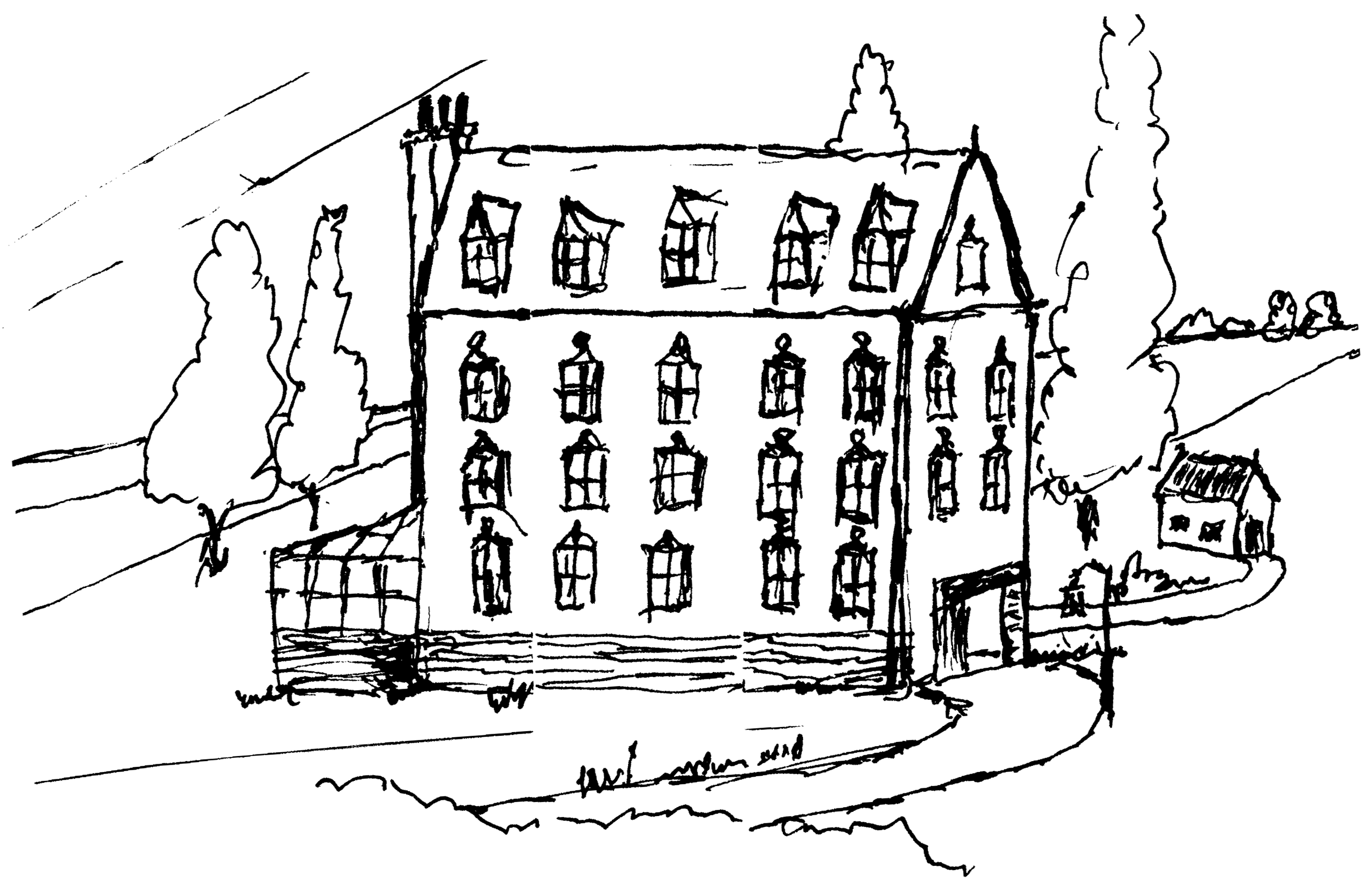
THE BIG HOUSE
We were very proud of our father. One year he won first place in the Royal Chelsea Rose Show. He rode the train to London for the show and brought back a box of fancy chocolates. Each night we were allowed to choose a luscious brown sweet.
“Oh, they are all so scrumptious. Which one shall I take?” we asked as we debated the merits of one over another.
One night Father went for the box and noticed empty spaces that were not there the previous evening. Father turned to us with an ashen face.
“Who has been into the chocolate box?” Utter silence met his question.
“Line up please.”
With the box in hand, he came before each of us. “Did you steal the chocolates?” Each of us claimed not to be guilty.
“Thou God seest me, children,” he quoted seriously.
I pictured a big eye looking down from heaven. Since no one confessed, he examined our coats that hung on pegs in the hall. When he reached my older sister’s coat, he discovered the wrappers to the chocolates. We all stood paralyzed. What would Father do? He went outside and cut a switch from a tree. Then in front of us, he switched my sister.
“Thou shalt not steal!” he commanded sternly as he applied the switch.
We all wailed our way to bed overcome by grief and shame. It was as if he’d switched all four of us.
The next morning was Saturday, the busiest day of the week. As we routinely prepared for Sunday, no one mentioned the chocolates. Father polished everyone’s shoes, and Mother baked. She made a roast for Saturday night, with potatoes, and vegetables that were always crisp, colorful, and delicious. After supper she thinly sliced the leftover roast beef and made sandwiches for Sunday’s lunch. Also in the basket for Sunday, she carefully arranged homemade baked sausage rolls, apple pies, and Dundee Cake (a light fruitcake), which she had baked earlier in the day. We bathed, washed our hair, ironed, and mended the Sabbath day’s clothing.
I mended clothing and could knit at the age of 5. Marta, a German prisoner of war who remained in England years after World War I, was my knitting teacher. My father trusted her and allowed her to become my friend. As we sat on our back doorstep, she taught me to knit.
“Marta, do you miss your family?” I asked her one day as I slowly twisted thick yarn around the long needle.
“Ja, fraulein, I do, but your vater has been very good to me, so I not complain,” she said. “Most of my family they die. I know not vere to return. House burned up. One day maybe I go back and see.” I sensed her sadness, set my needles down, reached up and gave her a childish cuddle.
As I grew older I loved to climb our apple tree surrounded by a canopy of leaves. I would knit to my heart’s content. To this day I knit the “German way” Marta taught me.
One day from my lofty perch I heard, “Mildred!”
Uh, oh, Mother used my full name. I must have done something wrong! I thought.
Quickly I climbed from the tree and ran to the front door.
“Yes, Mummy?”
“Put your needles and yarn down, and get your dust cloth and follow me,” she instructed.
She pointed to areas where that morning I had missed some dust. “A job worth doing, is worth doing right, Milly. Cleanliness is next to godliness!” I quickly removed the errant dust.
One year later, when I was 6, and mother was 48, I would relinquish my title of “baby of the family.” Mother was due to have another baby! In those days when a woman was pregnant, a midwife came to stay at the home a few weeks before the due date and stayed after for another few weeks. I did not care for the midwife who came to stay with us.
In the greenhouse as I was working with my father, I asked, “Daddy, why is that lady staying in our house? She goes outside in the afternoon, and when she comes back her breath smells funny, and she doesn’t always walk straight. She isn’t nice to us girls, Daddy.”
“What do you mean, Milly?” Daddy stopped his work, waiting for my explanation.
“Well, she yanks really hard at our hair in the morning when it needs brushing, and she says that she is going to ‘wop’ it off. Does she mean she’s going to cut it off, Daddy?”
“Don’t worry, dear. Mummy needs her to help deliver the baby, so be patient for a few more days.” I noticed that he didn’t sing or hum for the rest of the day.
The next morning as Ruth sat to get her hair brushed, our unwanted midwife drew a pair of scissors from her apron. One slash and a handful of long brown hair fell into Ruth’s lap.
“What are you doing to my hair!”
“Doin’ what should-a been dun ‘ears ago, cuttin’ the tangly stuff orf,” she growled.
Ruth sat immobilized. At that moment, Elsie came into the room and stared shocked at the short spears of hair that remained on Ruth’s head.
“Sit ye dun,” she ordered Elsie, and with one swoop from the scissors Elsie’s hair was gone.
“Do Mother and Father know what you’re doing?” railed Elsie.
“I’m in charge ‘ere now.”
Grace and I entered the house at that moment hand in hand. We were speechless as we viewed the floor covered with hair. The woman grabbed Grace.
“Oh, no you don’t!” Grace screamed. She jerked back and ran for the front door. I was right behind her. The midwife caught my free hand and wrenched me loose from Grace’s hold, slammed the front door shut, and pulled me back to the seat. Elsie and Ruth ran upstairs in torrents of tears. The midwife sheared me while I screamed vehemently. Just as the midwife was putting her shears away, the door swung open and my mother waddled into the house. She had just come from the greenhouse where she had been talking with Daddy.
“What ARE you doing, Miss Barnes?” Mother asked, aghast.
“Doin’ ye a favor.”
“But I, I, I didn’t ask for any ‘favors’!” Mother stumbled over the words.
“Wut’s dun is dun,” she retorted, and headed for the broom to sweep up the evidence.
That evening there were many tears as each of us tried to work with what remained of our hair. During our family evening devotions, which Miss Barnes chose not to attend, she did not hear the lesson that Father taught us on forgiveness.
“’Pray for those who do you wrong,’” he advised us, “and that includes Miss Barnes. We still need her, children. The baby should be here any day, and then we can see her on her way.”
A few days later, of all wonders, a boy was born! He was named John and all of Miss Barnes’ sins were forgotten with the thrill of his arrival.
The midwife stayed on for another week until the day my father caught her in the field, behind a tree with a bottle of whiskey. He invited her to leave immediately.
For a long time after John was born, Mother did not make the five-mile trek to church, but stayed home with the baby. One Sunday morning we girls, in our Sabbath best, left the house fifteen minutes before our father. The walk, which included descending a steep hill, was through a gorgeous part of English countryside. However, we were cautious as we walked, since frequent rains left the ground soggy and muddy.
“Let’s take a shortcut,” I suggested, wanting to pick some bluebells I could see in the center of a field.
We carefully climbed over the fence and headed for the dancing flowers.
From some distance, I heard our father, “Get out of that field, quickly!”
I glanced back at him. He was waving his arms frantically and shouting, “Look behind you girls! Run, run!”
I turned around and saw a huge black bull rise from the grass. It put its head down and pawed the ground.
My legs felt like rubber as I dropped the blue flowers and raced after my sisters. We reached the fence and scrambled over it, the territorial beast just behind us. I gasped for breath as the snorting bull pawed the ground only a few feet away.
After we brushed each other off, though visibly shaken, we continued walking to church where our father was a deacon. Both of our parents taught Sunday school. The minister of Burrough Green Baptist Church had baptized my parents and married them. A revered Bible teacher, he spoke so that even little girls could understand and remember his words. One of his sermons was taken from Nehemiah, (8:10) Eat the fat, and drink the sweet, and send portions unto them for whom nothing is prepared.
My father and mother took his lesson literally. Each Christmas a blind woman and a poor family with five children came to share our holiday “fat” and “sweet.”
A few years after John’s birth, Grace and Elsie left home to work for others, while Ruth and I became mother’s helper. One of the jobs that I had each day was to go for the milk from a farm a half mile away.
My sisters had bicycles that they earned, and I longed and prayed for one of my own. Our neighbor, Len Stead, who was the Brown’s chauffeur lived with his wife and little boy Ron in the other half of our landlord’s worker’s house. John often played with little Ron next door and learned unacceptable phrases and words. Every time we heard John come out with a dirty word, we told Mother. She did not believe us and said, “No, Johnny didn’t say that! He couldn’t!”
This denial frustrated me, and I wished that the Steads would move away so that my brother would not continue to be badly influenced.
However, it was Mr. Stead who found a bicycle abandoned by the Brown children, brought it home, fixed it up and gave it to me. I was ecstatic and quite amazed that God could use a foul-mouthed man who did not claim to be a Christian to answer my prayer!
It is not surprising that our beliefs affected our entire life. The public school that I attended was attached to the Church of England. The church dictated the hymns we sang and prayers said before class each morning. The ladies from that church also served the school children lunch.
“She’s going to hell,” I overheard one of my classmates tell her girlfriend out in the play yard. I turned and saw them point at me.
“I am not!” I gasped.
“Oh, yes you are! You weren’t christened when you were a baby, were you?” They both started to taunt in unison, “Milly’s going to hell, Milly’s going to hell!”
“I am not! I don’t know anything about being christened. I can’t help what happened when I was a baby!”
Just then the teacher appeared and hurried us all inside. It didn't make a lot of sense to me that I should be penalized for something that I had been too young to control.
Since they were Baptists, my sisters had been allowed to drop out of the Church of England catechism class when they were in school. However, by the time I came along, the school officials decided, "Milly can just join in and learn the catechism!"
We were taught the sacraments and holy days, but when it came to participating in the rituals such as Holy Communion, I was allowed to go home.
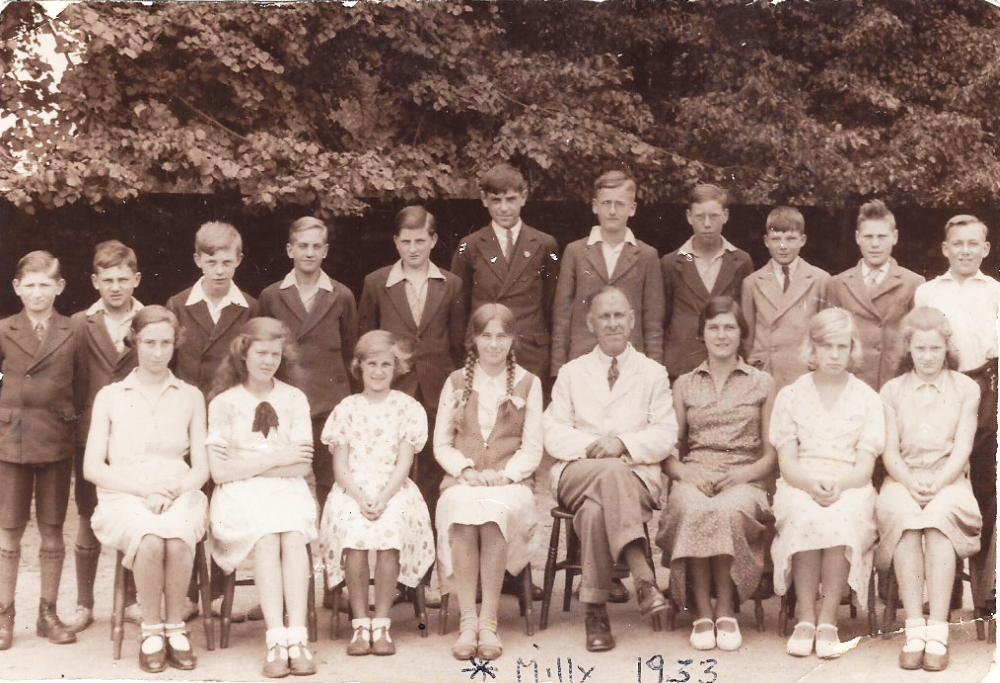
Domestic Science was my favorite class at school. We were taken by bus to Burrough Green, which was an adventure in itself, where they had the facilities to teach us cooking. I often brought home little offerings.
“Daddy! Look what I made today!” I showed my father the cupcake with chocolate frosting and trims.
“Well, it looks nice, but who are you going to feed with that little piece? You can't feed a family with that much!" Everybody got a tiny spoonful, and assured me that my culinary potential was great.
When I was 10, the minister at Burrough Green Baptist, Mr. Vine, went to India to do missionary work with his daughter. While he was gone a Pentecostal tent meeting came to a neighboring village. My father and sisters went to the first service. Father did not go again, but he allowed my sisters to continue to go.
“Oh, Milly dear! It was the most wonderful meeting I’ve ever attended! The singing had feeling in it, the praying was wonderful, and the preaching! Mr. Vine would have been moved by it!” Grace exclaimed. “I wouldn’t miss a gathering under the tent for anything! And they believe in prophesying!”
“What’s that?”
“That’s when God uses someone to tell someone else something about themselves, or about what’s going to happen.”
“Oh, like what? What did anyone prophesy?” I wanted details.
“Like Mr. Justin. He was told that he had constant headaches and that God wanted to heal him,” Grace said.
“Well, does he have headaches? Did God heal him?”
“Yes! When Mr. Justin heard it, he started to cry. He said that he had not even told his wife about the headaches. Everyone gathered around him and put their hands on him and prayed.
“Did you touch him, Grace?”
“I sure did. And Milly, he came back the next night with his whole family. The headache that had bothered him for weeks was completely gone, and he was so happy!”
“Did anyone else get a prophecy?”
“Yes, Miss Wilder was told to get right with God as God could see the wrong things she was thinking and doing.” Grace’s face fell. “Afterwards I prayed with her at the altar, and she said that she had been thinking about running away to London to live with a boy without being married.”
Before we fell asleep that night, Ruth and I discussed what our older sisters had seen and heard. “I sure wish that I could go to one of those meetings,” Ruth said.
“I’m not so sure.” I admitted. “I try to be a good girl, but maybe somebody would say a prophecy over me about something I’ve done wrong. That would be scary. Daddy keeps talking about Jesus’ coming again. I’ve been worried that if God should come, He might not even take me to Heaven!”
“Oh, Milly. Don’t say that. You’re scaring me. Go see if Daddy and Mummy are still here. Maybe they’ve already been taken, and just you and I are left! Can you hear them? Are they talking?”
“Well, no, I can’t hear them!”
“Oh, Milly, maybe they’ve been taken!” I went to the stairs and listened, still no sound. I crept down the steps until I caught sight of Daddy’s foot, then I raced back to Ruth and jumped under the covers. “They’re still here!” Then we both snuggled under the covers and fell asleep.
A few days later, I was alone in the house, and there was a knock on the door. I opened it and recognized one of the ladies that Grace had told me about from the tent meetings. “I’m Miss Girdlestone,” the refined, gray-haired lady said. “You must be Grace’s sweet little sister, Milly. Have you ever given your heart to Jesus, dear?”
A little surprised, I replied honestly, “No, I haven’t.”
“Would you like to?”
She asked so gently, my response came spontaneously, “Yes, I sure would.” I invited her into the playroom and we both knelt.
“The Bible says in I John chapter 1,” Miss Girdlestone began, “that if we confess our sins, He is faithful and just to forgive our sins. We humans are born in sin, shaped in iniquity, come into the world speaking lies, so it isn’t that we have to think of every tiny sin we’ve ever done. We need to accept that Jesus paid for all of our sins, and our sinful nature. If your sister Grace brought you home a gift, you could not enjoy it until you took it from her outstretched hands. And how would she feel if you insisted on paying for her present, or working for it? It is the same with God. He’s offering salvation from sin as a free gift, and you need to accept it from Him, and be grateful for His love.”
“Milly, do you know John 3:16?”
“Yes, For God so loved the world,” I started.
“I prefer to say it, For God so loved Milly, that He gave His only begotten Son, that if Milly should believe in Him, Milly, should not perish but Milly would have everlasting life. For God sent not His Son into the world to condemn Milly, but that Milly through Him might be saved!”
It sounded so wonderful to me, that right there in the playroom I prayed and told Jesus that I accepted the gift of forgiveness that He offered. “I am sorry for my sins, and thank you for dying on the cross to pay the price for them. I accept your gift.”
I then turned to my new friend. “Thank you Mrs. Girdlestone, I feel so much better!” After she left I ran outside and danced around the yard, skipping and laughing with glee. I no longer had a heavy heart!
As the days passed, I desired to accompany Grace and my other sisters to the Pentecostal get-togethers. When I asked my father for permission, he hesitated.
“Well, Milly, there are things about those meetings that I’m not sure about, but if Grace is willing to take good care of you, and you really wish to go, you may.”
“Oh, Daddy! Thank you, thank you, thank you!” I hugged his neck.
I could not get enough of the gatherings. I was sure that we were as the Christians in the time of the book of Acts. We sat in peace and silence at the weekly prayer meeting and prayed for those that came to mind. Sometimes a prophecy was said, sometimes a song was sung. Often there were tongues and interpretations. Each night we cycled back to our home, thrilled to have permission to attend.
Father met us at the door. “It’s all right, speak in tongues all you like in that church, but here at home I want to see fruit!” We knew what he meant; he wanted to see the love, joy, peace, meekness, long-suffering, goodness, and gentleness (Galations 5:22 and 23) that to him meant more than outward religious excitements.
One prayer meeting night, since I was required to pick up the milk before preparing to go with my sisters, I grabbed the milk jug, jumped on my bicycle, and peddled for all that I was worth down the hill and around the first turn to the dairy farm. I put my head back and reveled in the breeze that blew through my hair. As I careened around another sharp turn, directly in front of me was another person on a bicycle. I rammed headlong into him. My bicycle, the milk jug, and I parted company in midair.
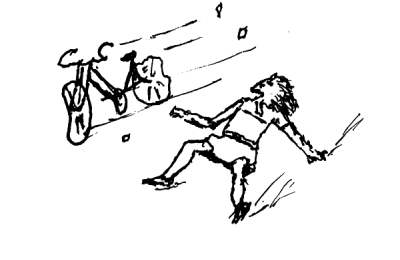
COLLISION
The man on the other bike was able to pick himself up and come to the side of the path where I lay unconscious. He picked me up and carried me in the direction from which I had come. My sister Grace, just leaving for the prayer meeting, saw the stranger carrying me up the road. She called for my parents, and I was brought into the house and laid on the bed. Mother went for smelling salts while Grace hopped on her bike and raced to the prayer meeting. She burst into the quietness of the room and panted as she caught her breath, “Milly’s been in an accident! She’s unconscious!” Immediately everyone took me to God in prayer.
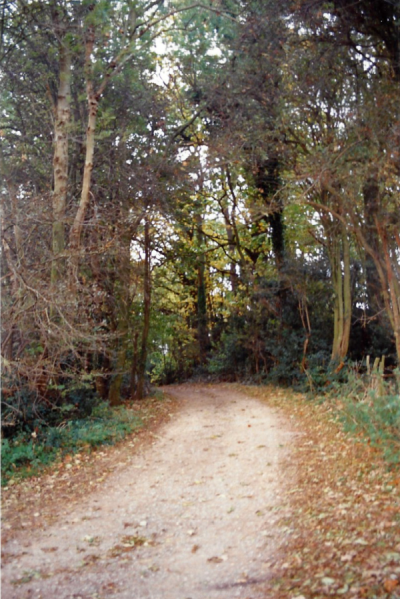
Grace then got back on her bicycle and peddled home. She opened the door to our house and took two stair steps at a time to my bedroom. There she found me with a big smile on my face and a bowl of soup in my hand. “Hello, Grace. Sorry I missed the prayer meeting!’
“You were there, Milly, in every one’s prayers!”
The following week after prayer meeting, a few of us stopped to discuss the upcoming events. “We’re going to put feet to our prayers. We’ve been wanting to evangelize our town, so next Saturday we’re going to march through the streets as a group, carrying Christian banners!”
“What will be written on the banners?” the girl next to me asked.
“One will say: ‘Prepare to meet thy God.’ Another: ‘Sinners repent.’”
My sisters and I didn’t have time to add to the conversation. We were expected at home. As we mounted our bicycles Grace asked, “Don’t you feel well, Milly? You look pale.”
“Grace, how can I carry one of those signs down the street in front of my classmates? I’ll die of fright and become one of our first martyrs.” For the first time I thought about cycling really slowly to purchase the milk and missing the gathering altogether.
“He who is ashamed of me is not worthy of me,” Grace whispered the quote to me as I later said goodnight to her.
The week went by too quickly. I slowly joined the eager group at the church hall as they gathered and chose placards. A friend came over dragging a sign too heavy for her. In bright red paint it read, “Ye must be born again.”
“Help me with this, Milly,” she asked. I reluctantly took my half of the weight of the big sign as she proceeded to the front row of marchers. Someone started to sing. I decided that if I was going to be laughed at, there might as well be good reason. Courageously, I raised my head and sang with the others as we marched down the street. When it was all over I realized that I had enjoyed myself and would be happy to do it again.
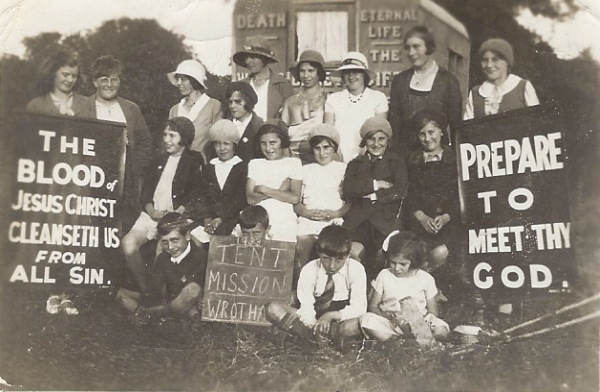
EVANGELIZING OUR TOWN
The more involved we got with this active Pentecostal group, the less Burough Green Baptist Church liked it. Father was unexpectedly invited to a deacon’s meeting. “You do not have your house in order,” the head deacon announced. “Your daughters are not in subjection, so unless you do something about it, we will accept your resignation.”
Father said, “Well, my girls are saved, and that is all that matters.” Mother and Father did not go to church for many years after that.
The leader of the tent campaign, a married man, to the horror of us all, got involved with a young girl of the group and left town with her.
Our father was beside himself. “That could have been one of you girls!”
When we were alone I asked Grace, “What happened? How could something so ungodly occur in our midst?”
Grace replied, “How could Judas leave Jesus after walking with Him for three miraculous years, then kill himself? I Corinthians chapter 5 tells of a Corinthian Christian whose sin was so bad that Paul had to correct him in no uncertain words. How could that happen? I cannot explain it. All I can say is, if it happened to the early church, it can happen to us.”
“What I have experienced these months has been real, and I can’t turn away from it,” Gladys said. As the little group faced community repercussions from the leader’s immorality, the hurting little assembly grew closer and even more sincere.
That spring we traveled by bus to London and met with other Pentecostals from all around the country in a big hall. As thousands of us raised our voices in songs of praise to God, it did not matter that we were called a cult or holy rollers. We were in God’s presence, and our hearts thrilled and rejoiced at the pleasure of being so close to each other and to the One who had won our hearts, the Lord Jesus Christ.
A few months later as we gathered in our little evening group, a prophecy came forth: “This little church will be closed, and you will be scattered to the ends of the earth.”
This seemed unreasonable and impossible, but it happened sooner than we could have imagined. Gladys went to Bible School to become a missionary. Grace’s employers moved to London and took her with them. Elsie and Ruth were offered better employment opportunities in London, so they submitted their resignations to Mrs. Gordon-Brown.
Since the Gordon-Brown estate was at that time having financial difficulties, they laid my father off and sold the property.
At this stressful time we received a letter from Grace.
Dear family,
I am keeping well and enjoying my new surroundings.
I was talking to a neighbor yesterday who has two young boys. She is quite desperate for help with them, and since Milly has turned fourteen, I thought of her. The lady seems kind, and I know Milly would get on well with the boys as she does so well with our Johnny. I would be next door and could help her whenever and however she needed me.
Elsie is doing well. I heard her boss tell mine that she’s never had such good home help in her life. You taught us well, Mummy!
Well, God bless you. Please take good care of each other for me.
Lovingly, Grace
P.S. I have found a very satisfactory church.
As prophesied, before any of us could have worked it out, we were in the first stages of being scattered.